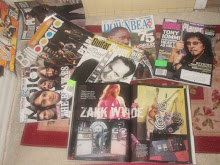From each according to his ability…
Karl Marx
Karl Marx
I’m not sure whether Tommy Pratama from Original Production, an Indonesian promoter who organised Toto concert in Indonesia, is Marxist or an adherent disciple of Microeconomics textbook. One thing for sure, he charged different prices for the Concert. It cost Rp. 350,000; Rp. 250,000; and Rp. 150,000 for VVIP, VIP, and Festival class, respectively. On the other side, Log Zhelebour, who was responsible for Skid Row concert, charged show-goers equally, i.e. Rp. 35,000. Why did they apply different pricing strategy? Apart from Log’s long well-known sacred mission (to make all metal-head happy by giving them world class or good rock ‘n roll show at affordable price), was there any economic reason for him to charge low price?
Many businesses, including show business (remember the saying: there’s no business like show business), price discriminate through customer self-selection. Businesses often use self-selection to induce different groups of consumers to respond differently. By getting consumers to voluntarily self-select into separate groups, businesses can enhance their profits through price discrimination. So, by applying price discrimination strategy, it is possible for producers to extract maximum rent from their consumer. They, however, should do it carefully, since each individual consumer, in principle, will always resist paying more than another. So, how will a producer play this pricing game? First, a producer needs to know whether the market is heterogeneous or homogenous. Next, a producer must identify which customers are the most price sensitive or he/she must devise a mechanism by which price-sensitive customers self-select.
Tommy knows that market for Toto is rather in stratum. It goes across types of people: from music freaks or practicing musicians who want to watch the playing of Steve Lukather and to observe the sound system to beautiful metro sexual people who want to be seen; from those who grew up with Toto music but now they are young or working adults to teenagers who don’t want to miss any show in the town. On the opposite, Skid Row fans are more homogenous. Regardless of their social economic status, they are basically all the same: metal-head people. The range of price sensitivity across consumers of Toto concert is likely much wider than that of Skid Row concert. In addition, in an open door concert like the case of Skid Row show, it is harder to separate entry door or divide space according to different classes of ticket. In short, Tommy has a larger room to price discriminate than Log does.
Log charged low price to induce more people coming. Given the design of the show (more cities and open door), this lower price was offset by higher expected volume of sales. Tommy’s mode price was higher than Log’s uniform price by the factor of ten. But, it was reasonable to expect that Log’s sales volume was at least ten times larger than Tommy’s. So, it is not the case of the sane Tommy versus the insane Log. Log simply took different path and his path was also economic sensible.
Advice to Fellow Consumers
When you’re traveling by airplane, never ask how much a person sitting beside you paid for the airfare. You may feel worse off if he/she paid cheaper than you did. But, if you don’t bother not being a VIP in a rock concert as long as you love the band and its music, just pay for a festival ticket. During the show, you could feel better off than those who paid much higher price. It is often the case the band will ignore all rules of price discrimination. Rock stars don’t like their fans being segregated by the promoter. On stage, they may shout like this: “ C’mon everybody, kick those seats, everybody come closer to me, stand up and shout…let’s rock together”. It was the case of Toto concert. I paid for a festival ticket, but I enjoyed the position of a VVIP ticket holder. I felt so much better off for paying less. Thank you, Steve!

No comments:
Post a Comment